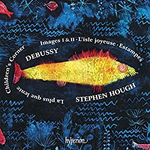|
Back
02/19/2018
Claude Debussy: Estampes, L 100 – Images, L 110 [Set I] – Images, L 111 [Set II] – Children’s Corner, L 113 – La plus que lente, L 121 – L’Isle joyeuse, L 106
Stephen Hough (piano)
Recording: St. George’s Church, Brandon Hill, Bristol, England and Concert Hall, Wyastone Estate, Monmouth, England (June 18-19, 2015 and August 30-31, 2016) – 69’25
Hyperion CDA61839 – Booklet in English, French and German

   
It would be remiss to comprehend Stephen Hough’s aura and his Debussy without taking a backward glance into the multi-artistic disciplines he’s wrapped into one. Imagine someone memorizing over 100 nursery rhymes at a very young age...that’s enough of a precursor to foreshadow déxtérité extraordinaire. Stephen Hough is a Renaissance savant: gifted not only as a pianist (he was bestowed Commander of the Order of The British Empire – for music – in 2014), he beautifully expresses himself as a painter, writer and composer, and the package is made all the more perfect when turning to Claude Debussy. This polymath has a seminally seamless entrée into the soul of M. Debussy.
A sense of soufflé softness surrounds all compositions on this Hyperion release. Forte and piano are dutifully obeyed sans overreach. The listener will be amazed at how deftly Stephen Hough can push the right hand while relinquishing power to the left [hand] (and vice-versa) in an effort of magnify melody and harmony with more determined meaning and eloquence. Claude Debussy’s subjects come alive.
We’re continuously lulled into hypnotic trances by the distinctive pulsations Mr. Hough indelibly drives home. Such grand presentations can be found in Images I’s “Mouvement”, Images II’s “Cloches à travers les feuilles”, “Golliwogg’s cake-walk” (from Children’s Corner), and perennial darling L’Isle joyeuse, to name a few.
But the accomplished pianist can also “toy with our emotions.” Whimsically, Stephen Hough turns the tables upside down during La plus que lente, in an ironic disposition of mild scherzo-like impishness. The interpretation has fluidity, is care-free and teems with an ebullient understatement. In all, the take-away is refreshing.
Frequently, pedals are utilized to give sharper cut off to ending notes. This technique adds distinctive character and re-emphasizes the notion of fleeting moments. Additionally, application of the sustaining pedal transcends enough imagination to give pieces blurry definitions, aiding in limpid construction such as within “Reflets dans l’eau.” One of the best demonstrations of Mr. Hough’s lofty credentials is reflected inside his version of “Poissons d’or”...the shimmering fish are textured with lavish predilections. Equally superb is the way he creates quixotic tempos to add, yet, another layer of ethereal meaning to Debussy.
Holding great fascination is Stephen Hough’s L’Isle joyeuse with its unbridled and unexpected cadences which generate effervescent magic...the interpretation is the most superlative presentation [by this reviewer] ever heard. Somehow Stephen Hough finds a way to touch the inner nerves of our audio pathway to generate a pleasantly surprising storyline and happiness.
This Englishman spares over lavishness and, yet, he gives notes a more personal, organic connection. At times Mr. Hough brings staccato ambition to the notes, as in the case of “La Soirée dans Grenade.” Rubato regales in every niche, and the listener’s enriched experience is the one to gain.
This reviewer, having been drawn to these oft-performed Debussy compositions for many years, believes this is one of the most arresting displays of poetic grandeur: ears will melt into mesmerizing impressionistic reveries.
If there’s any caveat, it rests with Booklet Editor, Peter Hall: François Lesure’s catalogue numbers (on the back panel) are mislabeled...perplexing, to say the least, about blue-chip Hyperion’s oversight; nonetheless, this doesn’t detract from Stephen Hough’s much deserved kudos.
There is a story to tell through the eyes of Stephen Hough. Never will one find a discovery quite this magnificent. For a man sensitized to diction, deep pathos and care, the élan is keenly observed. A must for Debussy lovers!
Stephen Hough Website
Christie Grimstad
|